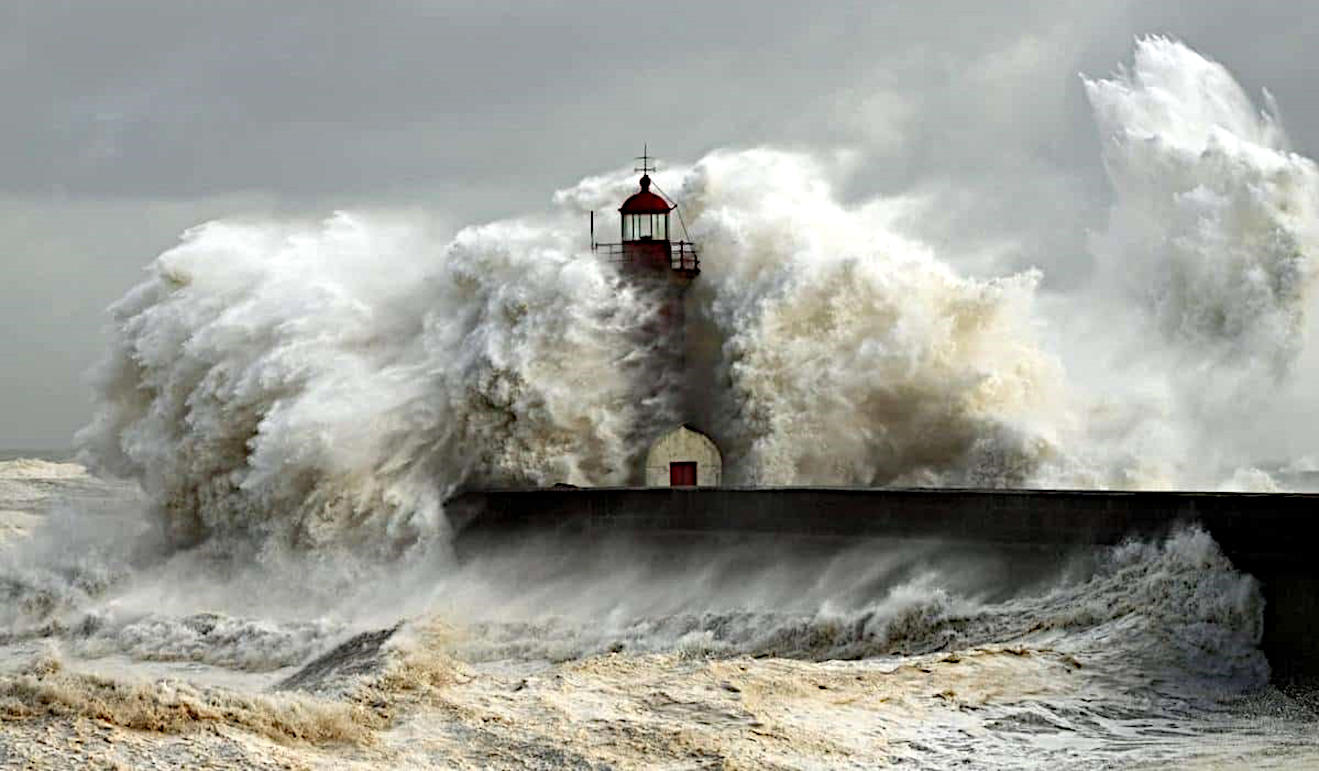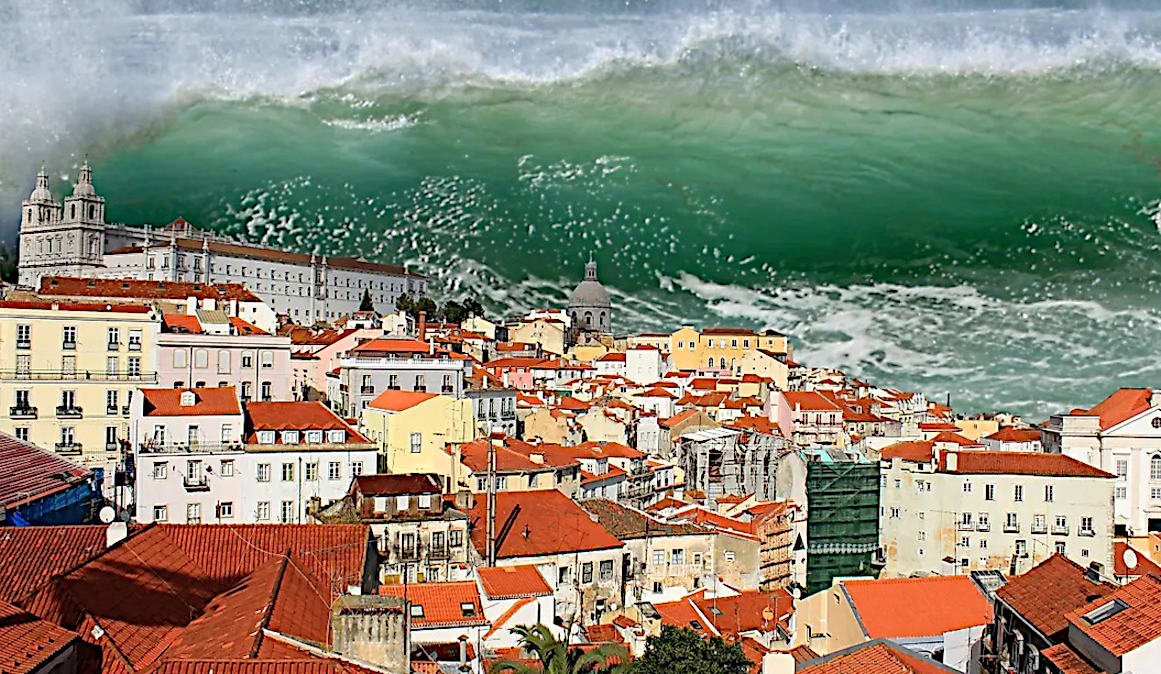
Tsunamis are just long waves — really long waves. But what is a wave? Sound waves, radio waves, even “the wave” in a stadium all have something in common with the waves that move across oceans. It takes an external force to start a wave, like dropping a rock into a pond or waves blowing across the sea. In the case of tsunamis, the forces involved are large — and their effects can be correspondingly massive.
A tsunami is a series of extremely long waves caused by a large and sudden displacement of the ocean, usually the result of an earthquake below or near the ocean floor. This force creates waves that radiate outward in all directions away from their source, sometimes crossing entire ocean basins. Unlike wind-driven waves, which only travel through the topmost layer of the ocean, tsunamis move through the entire water column, from the ocean floor to the ocean surface.
In legal usage in the English-speaking world, an act of God is a natural hazard outside human control, such as an earthquake or tsunami, for which no person can be held responsible. An act of God may amount to an exception to liability in contracts (as under the
Hague-Visby Rules) or it may be an "insured peril" in an insurance policy. In Scots law the equivalent term is damnum fatale.
By contrast, other extraordinary man-made or political events are deemed force majeure.
BIBLICAL PUNISHMENTS - DIVINE INTERVENTION
Divine intervention is an event that occurs when a deity (i.e. God or a god) becomes actively involved in changing some situation in human affairs. In contrast to other kinds of divine action, the expression "divine intervention" implies that there is some kind of identifiable situation or state of affairs that a god chooses to get involved with, to intervene in, in order to change, end, or preserve the situation.
EXAMPLES
Stories of divine intervention typically include a background story that lays out what "the situation" is and why the god in the story chooses to intervene. Often the god steps in to help or protect someone or something favored by the god.
A prototypical story of divine intervention can be found in Hindu mythology, in the story of Narasimha. In the story, the demon king Hiraṇyakaśipu has extracted a guarantee from Brahma that he can be killed neither by man nor animal, neither indoors nor outdoors, neither during the day nor during the night. Feeling invulnerable, Hiraṇyakaśipu begins to persecute devotees of Vishnu, whom he hates. A Vaishnavite boy named Prahlāda prays to Vishnu for help. Vishnu hears his prayer and manifests himself as Narasimha (half-man, half-lion) and rips Hiraṇyakaśipu apart in a doorway (neither indoors nor outdoors) at dusk (neither during the day nor during the night).
In ancient Greece, divine intervention was frequently sought from the gods of the pantheon of Greek mythology, which contained accounts of such intervention. In The Iliad, substantial attention is given to the involvement of Zeus and Poseidon involving themselves on the side of either the Greeks or the Trojans in the Trojan
War - engaging in miraculous acts, changing the weather, or bolstering the strength of combatants to aid their preferred side.
One of the most famous stories of divine intervention occurs in the Old Testament when Yahweh parts the Red Sea to allow his chosen people (Moses and the Israelites) to escape the pursuing army of the Pharaoh. Then Moses stretched out his hand over the sea. The Lord drove the sea back by a strong east wind all night, and turned the sea into dry land; and the waters were divided. The Israelites went into the sea on dry ground, the waters forming a wall for them on their right and on their left.
PHILOSOPHY
The notion of divine intervention assumes that God or gods exist, that they take an active interest in human affairs, and that they choose to intervene in human affairs (for reasons that may or may not be clear). These assumptions lead to a number of philosophical issues surrounding the idea of divine intervention.
William P. Alston has written that "Talk of divine 'intervention' stems from a deist picture of God as 'outside' His creation, making quick forays or incursions from time to time and then retreating to His distant observation post." Alston, however, overlooks the fact that deists typically reject the notion of miracles and divine intervention. He also overlooks the fact that tales of divine intervention occur most frequently in religions that view the gods as very human-like interested observers
of - and active participants in - human affairs.
Even if one assumes the existence of God or gods, there is still a problem of providing plausible reasons for attributing a specific event to divine intervention, as opposed to attributing it to natural causes or simply random chance.
Another serious problem is establishing the credibility of reports of divine intervention. Often reports of divine intervention include reports of events that violate natural law. David Hume argued in this famous essay Of Miracles that one can never be justified in accepting such reports.
Related problems include the problem of the existence of God, the nature of laws of nature, the problem of evil and the question of why God allows (or causes) natural disasters and tragedies to happen, and questions surrounding the notion of fate or destiny. The notion of special intervention by God becomes problematic, for instance, if one also believes that God controls everything that happens, and that nothing happens that God does not will to happen. As R.C. Sproul says: "In a universe governed by God, there are no chance events." In such a universe, everything that happens is, in a sense, a result of divine intervention.

CONTRACT LAW
In the law of torts, an act of God may be asserted as a type of intervening cause, the lack of which would have avoided the cause or diminished the result of liability (e.g., but for the earthquake, the old, poorly constructed building would be standing). However, foreseeable results of unforeseeable causes may still raise liability. For example, a bolt of lightning strikes a ship carrying volatile compressed gas, resulting in the expected explosion. Liability may be found if the carrier did not use reasonable care to protect against
sparks - regardless of their origins. Similarly, strict liability could defeat a defense for an act of God where the defendant has created the conditions under which any accident would result in harm. For example, a long-haul truck driver takes a shortcut on a back road and the load is lost when the road is destroyed in an unforeseen flood. Other cases find that a common carrier is not liable for the unforeseeable forces of nature. See Memphis & Charlestown RR Co. v. Reeves, 77 U.S. 176 (1870).
One example is that of "rainmaker" Charles Hatfield, who was hired in 1915 by the city of San Diego to fill the Morena reservoir to capacity with rainwater for $10,000. The region was soon flooded by heavy rains, nearly bursting the reservoir's dam, killing nearly 20 people, destroying 110 bridges (leaving 2), knocking out telephone and telegraph lines, and causing an estimated $3.5 million in damage in total. When the city refused to pay him (he had forgotten to sign the contract), he sued the city. The floods were ruled an act of God, excluding him from liability but also from payment.
An act of God clause in a contract does not imply that no one is liable for damages.
A natural disaster, such as a flood or an earthquake, usually isn't foreseeable or preventable. Importantly, though, the insured cannot use the event as an excuse for not taking reasonable care to try to prevent or protect against damages.
Say a dilapidated warehouse collapses during an earthquake and injures bystanders. The owner claims an act of God caused the building to fall. However, the insurer will likely deny the claim, and there may be no recourse in court because the owner did not take reasonable care to maintain the structural integrity of the building.
Likewise, governments also need to take reasonable care to prevent disasters. Say a state failed to maintain a dam that bursts and caused major damage to a community. This is not an act of God. Intense rains may have caused bodies of water to swell, but the flooding was a direct result of the government's lack of action to maintain
water retention systems.
A judge ruled the flooding in New Orleans caused by Hurricane Katrina (an act of God) as an act of negligence because the U.S. Army Corps did not properly maintain flood defenses.
By
the same reasoning, damage caused to property resulting from
global warming, might be attributed to the administration in
that area, failing to reach carbon emission lowering, to
meet the Paris Agreement targets. The insurers would need to
bring an action against the State, or Crown.
For example, where there might be no clearly defined method
of achieving such reductions, due to policy errors or
failure to calculate a means to realistically transition to
renewables.
As
is the case for most G20 nations. Who contract with it's
citizens to provide a healthy and lasting geographical
location in which to reside, for themselves, their children
and the grandchildren.

In the John
Storm series (franchise) of ocean and subsea, or
innerspace adventures, there are a number of events that one
might come to suspect were not entirely natural, Acts of
God, but more Divine Intervention. A way of resetting the
clock, and a warning to mankind as to the folly of their
ways.
Climate
change and ocean pollution are two issues where divine
intervention may in the future, become necessary, where anthropogenic
and unnatural abuses of the natural world, or over
exploitation, could be a punishable offence. How spiritual
forces may cause this to come to pass, is for politicians to
dwell on, as desertification, ocean acidification,
wildfires, hurricanes, floods, sargassum
plagues, marine
litter and raised sea levels, famines, pandemics, food
and energy crises, all exert economic pressure, likely to
cause world war three and four - by way of the final outcome
- or Armageddon.
How many conflicts will it take?
So
it has been foretold in the Bible, though no explanation or
details as to the lead in is provided. Assuming that an
intelligent species would know better, than to be so greedy,
as to wreck the host planet. And presumably, elect
responsible leaders to govern inappropriate exploitation.
Doing away with freefall kelptocratics. Such as the building
of desert entertainments, that increase carbon footprints,
where more appropriate locations could see such attractions
zero emission.
Las
Vegas is an example of a modern day sin city. Built on
gambling, a vice not a virtue. Such development is in part
responsible for
Extinction
of a species is nothing new on earth. Dinosaurs (Mammoths,
Sabre Tooth Tigers, Megalodons) were the masters of the
planet millions of years ago. An example of resetting the
clock, to make way for alternative advancement.
The
question is, what biological evolutionary strain will
replace humans, as the next stage of mutation of intelligent
life. Hopefully, more so. Or, is the finality robotic
Artificial Intelligence?
REFERENCES
https://www.


